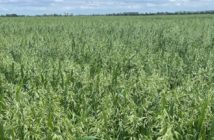BASF is well known in the industry for developing cost-effective solutions to help growers of smaller acreage crops such as fruit and vegetables. Now they are providing some of their key and new actives to the small but expanding group of grape growers in the UK.
BASF is able to offer UK grape growers a range of highly effective fungicides including Kumulus (sulphur) for powdery mildew control, and has EAMU’s Percos (ametoctradin and dimethomorph) for downy mildew control, Filan (boscalid) for Powdery Mildew (Uncinula necatar) Scala (pyrimethanil) for Botrytis, Stroby WG (kresoxim-methyl) for black rot, Phomopsis and powdery mildew control, Sercadis (fluaxapyrad) for powdery mildew and the growth regulator Regalis Plus (prohexadione) for Botrytis (this works by modifying the plant architecture, allowing more air movement in the vines and so reducing disease risk). In order to reduce resistance build up growers should apply products with different modes of action in the crop; BASF can offer 4 fungicide solutions for powdery mildew and 2 for Botrytis.
“The UK wine industry is growing exponentially. The hectarage of grapes has tripled since 2000. There are now over 500 vineyards and we produce 5.9 million bottles of wine a year, according to the industry group WineGB.,” says Matthew Goodson of BASF.
“But growers need the tools to be able to grow a high yielding, high quality crop. We have got most of the key diseases in grapes covered with our products and we are offering a number of different modes of action that can be used in a strategic way as part of a resistance strategy. We are continuing the process to get more recommendations for more products in the future. BASF is seen one of the leading manufacturers for top fruit and vegetables and we want to be seen in the same light by our grape growers.”
Matthew reminds growers that for any EAMU, growers should obtain a copy of the notice of approval via the Chemicals Regulation Directorate (CRD) web site, ADAS offices or NFU. In the EAMUnotice of approval, CRD point out that liability lies with the user and growers are advised to test a small area of crop prior to commercial use.




